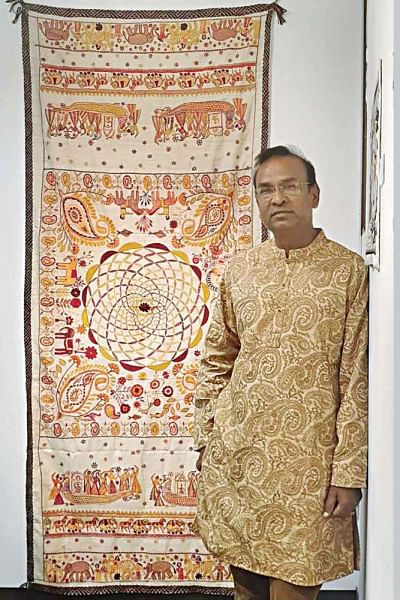Breaking taboo with needles

Seeing young Aminul Islam's keen interest in embroidery and needlework, the villagers used to tease him saying, "Embroidery is for women and girls. Why do you like it so much? Are you a housewife?"
The persistent shaming could not bring Aminul down. Ultimately his unwavering passion for embroidery and needlework paved the way for a prosperous future.
Born to an impoverished family in Laxmandia village of Jhenidah's Shailakupa upazila, the 55-year-old Aminul is now a successful entrepreneur and supplier of embroideries to renowned handcraft stores in the country.
His range of embroidered handicrafts includes traditional embroidered quilt (Nokshikantha), framed tapestries, wall hangings, curtains, cushion covers, bed covers, hand-woven jewellery bags, and saris and three-piece sets (for women).
In 1987, when Aminul's father Golam Kausar Ali died, his mother Akhtar Banu had seven children to rear by herself. Left with nothing but a house on 10 decimals of land, Akhtar Banu resorted to doing embroidery for a living. There were days when the family had to survive on only vegetables grown in their yard.
Aminul, the youngest of the siblings, studied sitting next to his mother while she did various forms of needlework including embroidery, quilting and stitching.
While his brothers worked at agricultural fields of others and sisters were busy doing household chores, young Aminul helped his mother with her embroideries.
Despite being tormented by the neighbours, Aminul set his mind on being an embroidery artist. By the time he finished his SSC in 1982 and HSC in 1986, Aminul became a master embroidery artist.
Success eventually followed him after he went to Dhaka to seek his fortune in 1990. Soon enough, he received an order of embroideries worth Tk 7,000 from renowned brand store Aarong. Within five years the monthly order volume from the store reached Tk 40 lakh and Aminul never looked back.
Ever since, Aarong recognised Aminul as their best supplier every year and in 2018 they conferred 'Best Quality Award' on him. A solo exhibition of embroideries designed by Aminul was held at Kahal Gallery in Tokyo of Japan in 2019.
Gias Uddin, Aarong's manager administration and logistics support, said Aminul has been their best supplier since 1995 as the merchandise supplied by him has been of highest quality.
Between 1990 and 2018 he procured more land beside his ancestral land to build a workshop for rural women who earn their livelihood by doing embroidery for him.
But the two-storey house, spread out on about 15 bighas of land, went unused as the workers preferred to work from their own homes while looking after their children and doing household work.
Avid nature lover Aminul then decided to turn the empty house into a country retreat. The house now overlooks a meticulously landscaped lush green garden adorned with nearly 5,000 various local and foreign plants, shrubs and hedges -- trimmed skilfully to perfection. Fruit trees are planted only on the rooftop of the house.
Aminul owns a six-storey house in Dhaka's Uttara from where he conducts his business activities.
Around 2,500 rural underprivileged women in Shailakupa used to make a living by making embroideries for him. But in recent times, after the novel coronavirus pandemic broke out, his orders fell to as low as Tk 10 lakh per month. Now, and around one thousand of the women are still employed at his workshop.
Aminul said as he wants to continue supporting the underprivileged families in his village home through his work, he has been trying to regain sales by selling the merchandise from his online store on Facebook (www.facebook.com/banglaselayi).
He and his wife Snigdha Islam live in Dhaka. They have a boy and a girl.

 For all latest news, follow The Daily Star's Google News channel.
For all latest news, follow The Daily Star's Google News channel. 



Comments